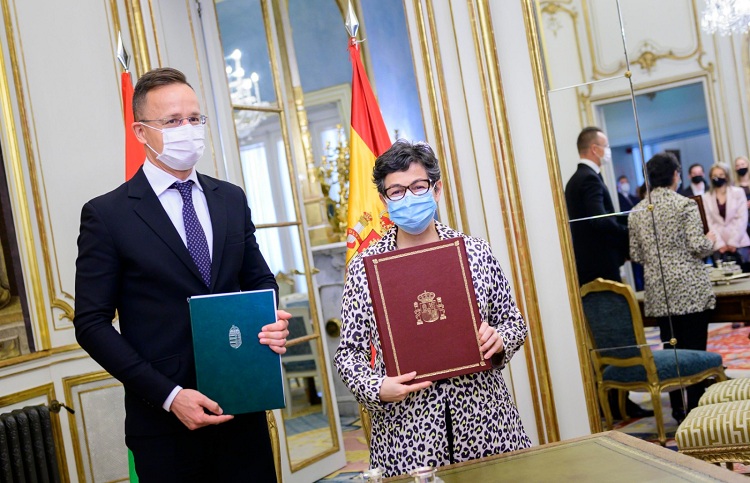Eduardo González
The Hungarian Minister of Foreign Affairs, Péter Szijjártó, yesterday took advantage of his meeting in Madrid with the Minister of Foreign Affairs, Arancha González Laya, to lash out against the imposition of mandatory quotas in the European mechanism for the distribution of migrants and refugees, a measure defended by Spain which, in his opinion, would generate “a call effect”.
“We Hungarians cling to our right to decide, for ourselves, who we let in, who we want to live with and who we do not want to live with and, therefore, we will not accept any quota for the admission of refugees or Brussels telling us who we should accept”, said the Hungarian minister during a joint press conference at the Palacio de Viana after meeting with his Spanish counterpart.
“Quotas generate a call effect and create new waves of migration”, he continued. “Only those who respect the rules can enter Europe and crossing the border illegally is a crime”, he warned. Apart from that, in Hungary it would not be “feasible” to implement “a common migration policy providing for the obligation of quotas because the Hungarian nation voted in a plebiscite” against this possibility, he added. “We must defend the external borders” and prevent “situations at the external border like the one of the last few days”, he said, in an implicit reference to the recent avalanche of Moroccan migrants in Ceuta.
For her part, González Laya limited himself to stating that “both Spain and Hungary are negotiating within the EU” the new migratory and asylum pact and stressed “the importance of the external dimension of this pact and the cooperation with the countries of origin and transit”.
Last September, the European Commission presented its proposal for a new asylum and migration agreement that does not include a system of mandatory quotas for the distribution of refugees and is limited to establishing a “flexible and voluntary” method for the “fair sharing of responsibility and solidarity”. With this solution, the Commission aims to find a middle ground between countries that have called for a mandatory quota mechanism for the reception of people, as is the case of Spain, and countries that flatly refuse to take in refugees or migrants, such as Hungary, Poland and Austria.
At the same press conference, González Laya and Szijjártó announced the upcoming inauguration of the new Hungarian consulate in Malaga, which “will help the presence of Hungarian citizens in Spain for tourism”, according to the Spanish minister, and highlighted the possibilities of economic cooperation between the two countries.
In this regard, Gonzalez Laya reported the interest of Spanish companies in automotive, hospitality, renewable energy and transport to invest in Hungary and announced the forthcoming reopening of air connections that “Iberia offers between Hungary and Spain”. For his part, Szijjártó assured that “economic cooperation between the two countries is increasingly close, with 230 Spanish companies in Hungary employing 5,000 Hungarian employees”.
The two ministers also discussed the improvement of Spanish language teaching in Hungary and signed a Memorandum of Understanding between the Spanish Ministry of Foreign Affairs and the Hungarian Ministry of Foreign Affairs and Trade on the exchange of officials.







